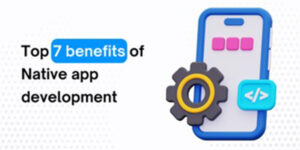
Are you thinking of building a multi-platform app? Sounds like a brilliant plan?
Android and iOS mobile operating systems have taken over the digital world. In 2020, 88% of 13.09 billion mobile devices used Google’s Android, and around 10% of them run on Apple’s iOS. In other words, both systems give you a significant opportunity to reach the intended target audience, but by choosing only one platform you risk losing many potential customers.
Cross-platform development (adapting a product to multiple platforms at the same time) can be a good solution for start-ups that do not have the budget to build two native apps, but who want to reach as many users as possible right from the start.
Our article will tell you what benefits your business can get from cross-platform apps, and make you aware of the disadvantages that come with it.
Table of Contents
Benefits Of Cross-Platform App Development
Cross-platform app development can look like a shining opportunity for the business. The development model reduces costs and gives you a large audience shortly after the project launch. But not only that!
Faster Development:
The biggest advantage of cross-platform development is that it is less time-consuming. It requires only one code base to create a finished digital product. This means you need fewer developers, which in turn is cost-effective.
And to make any necessary changes to the final product before the launch date, improve a single multi-platform code, not two separate code bases. The bottom line is – it takes less time for a cross-platform app to reach the market.
Lower Development Costs:
This benefit is associated with the previous one. Cross-platform app development enables business owners to upload their products across multiple platforms (Google Play Market or App Store) without further investment in native app development. Therefore, the approach works well for the company’s digital products that are rarely profitable in a classic way. The company can save funds on developing a universal solution.
Wider Exposure:
With development for several platforms, you have a large market reach. As for the framework you use to develop your code, it can run on Android, iOS, Windows, BlackBerry, and other OS devices. By running on different platforms, the MVP version of the app will show you which platform is worth investing in. After that, you can improve a native app for that platform, and focus your marketing.
Correspondence Between Platforms:
Modern frameworks for cross-platform apps are extremely practical and dynamic. Compared to the development of native apps, it is easier to build a highly standardized app using Xamarin, React Native, Flutter, or Adobe PhoneGap. The necessary features may not be exactly as you had imagined, but there are many tips on how to develop complex ideas with cross-platform development tools.
Cost-Effective Updates & Reusable Code:
With native development, you will need to update several separate apps if you want to enhance your digital product. Code written for multiple platforms can be customized at any time – and you will immediately see the changes on all the platforms it was developed for.
Compared to native apps, you not only save development funds, but you also incur fewer costs for app enhancement, fixing, and customization according to user feedback and usage statistics. You can also save the code and use it later for other projects.
Smart Cloud Integration:
In 2020, most cross-platform apps, as well as hybrid apps, were based on cloud technology. Therefore, their development framework has many tools for cloud integration, including special add-ons that are useful for enhancing the features of the apps or customizing the design. It is also easy to store user data in the clouds.
No Specific Language Is Required:
Your employee developers will face fewer technical barriers when working with a cross-platform app. Whether they specialize in HTML, CSS3, or JavaScript – they can build a well-functioning app using their knowledge. And when it comes to outsourcing, you save costs, as you do not need to have Objective-C or Swift specialists on the external team. Read more about the pros and cons of outsourcing on our blog.
Good For Prototyping
Build a cross-platform app as an MVP to check the potential of your business idea. This approach will cost less than developing a native app and will help you reach 98% of mobile users. It is a good strategy for new businesses, which makes it possible to reduce the risk of spending large sums on an idea that is not profitable.
Cross-platform apps also work well for prototyping and presenting ideas to investors. Collect feedback from users, analyze statistics or let investors see your innovative project directly on their mobile – with a multi-platform approach that is more cost-effective than ever.
We recommend that you think carefully before you choose, and if you have any questions, just contact Code Creators Inc. and we are happy to help you!

Disadvantages Of Cross-Platform Apps:
But it is said that nothing is perfect. And the cross-platform apps are no exception. Along with great options like cost-effectiveness and cost reduction, come limited design options, low speed, and code loss in case you build a native app instead.
Find out if there are any downsides to developing a cross-platform app that will be critical to your business!
Lower Performance Due To Harder Code Design:
The statistics show that 1 in 5 users decide to delete the app if they find that it has slow performance. Time is the most valuable resource in 2019. You will undoubtedly lose some of your users (up to 20%) if the app annoys them with its slow operating processes. Cross-platform app code is a bit more complicated than that used for native apps. This is why it usually slows down the overall app speed.
Poorer UX & UI Design:
Hardware that supports eye-catching animated features, 3D effects, and stunning graphics – this is probably reserved for native apps, unfortunately. Most cross-platform apps cannot use all the built-in features of the mobile device, so the user experience is therefore worse.
The fact is that all devices have their specifications, and it is impossible to achieve the same functionality with a single one-for-all code. As a result, developers need to simplify the features to make the screen layout and graphics look the same on each device.
Long Waiting Time For Integration Of New Functions:
Those who decide to build a cross-platform mobile app will always have to adapt to the chosen framework for app development. And the problem with them is that they have an update delay. While Apple is adding features to iOS, or Google to create new features in Android, these frameworks need to change the development tools to allow new features to be integrated when operating systems are updated. This takes time.
And if those working with native apps start improving them immediately after an OS update, cross-platform apps will always lag a bit behind, and thus seem a bit outdated.
Limited Customization & Integration Of Native Features:
In the previous section, we talked about upcoming OS features, and here we focus on existing ones. The development framework may not support all the features you need, including a part related to hardware functionality (notification features, camera, or GPS), and integration with device settings and built-in storage access.
The lack of support for basic functions can result in the entire application being blocked! In the blog article How much does it cost to build an app, you can read about what kind of features are crucial for your app.
Code Loss When Switching To Another Platform:
Keep in mind that the most cost-effective way to build a cross-platform app is to use a development framework designed for this type of application. The framework locks the project in the same way that website builders allow you to create pages without allowing you to use the same page on another website.
Therefore, be careful when choosing a framework! If one day you decide to switch to another framework, all previous efforts will be lost.
Limited Toolbox Within The Framework:
It is safe to build a cross-platform app if you know exactly what features you need to implement in your app, and you are sure that this is possible with the chosen development framework. If you are unsure, you may want to consider another option.
For many businesses, there may not be enough tools for app customization. Ruby on Rails, Java and TypeScript are believed to be the best programming languages for developing applications that can be adapted to several platforms. But they are not perfect.
How to solve the problem? It is a good idea to start by hiring dedicated developers with cross-platform expertise. No matter what framework they are going to use (Flagare, Ionic, Apache Cordova (PhoneGap), Xamarin, or React Native), they will probably know them better than you and can choose a development platform that suits your desired features.
In Code Creators Inc., we prepare the projects with Flutter, which is a tool for user interfaces developed by Google. Flutter is designed to create native apps for various platforms, including web, mobile, and desktop using a single code base.
When Multi-Platform App Development Is Better Than Native App Development
What is the main purpose of developing a cross-platform app? Unlike native apps, apps of this type are compatible with more than one operating system. When you create such an app, you only need to develop one code, and then the product is launched on both the App Store and the Google Play market. You reach a wide audience in a short time.
Cross-platform software development can halve the cost of development, save time and be easy to update. But it will also limit the possibilities for design customization, and not always give you access to the full range of operating systems and hardware features. Therefore, the approach is not particularly suitable for these businesses:
- IoT-related products to be incorporated with specific device features.
- Apps that are based on the possibilities for customization of profile.
- Products that need updating frequently should consider native software.
- Apps that handle fast incoming information (for drivers or operators).
- Products must work online (does not accept cloud technology).
Cross-platform web development is not the same as hybrid app development, but they do have some features in common. For example, they are both considered to be cloud-based sustainable universal solutions. They are also often standardized in design as they are built from ready-made modules using a development framework.
So what about the projects that fit perfectly with a cross-platform app? Today’s cross-platform apps are more reliable and user-friendly than previous versions. They are often used for projects like this:
You Need A Wide Range Of Users:
If the goal is to prove to yourself, or your investors, that the business idea is viable, but you have limited funds, you should choose a website or an app that can be customized across platforms. It will allow you to set your target audience, study user behaviour and prepare for complete native app development.
Design Is Less Important:
It may be surprising to hear, but not all apps need to be extremely beautiful. Think of stock trading tools or web analytics apps for example. Sometimes, if you have a good digital idea, there is no urgent need to present it in a fancy custom-designed way. Features come first.
You Develop A Business App:
Even though there are thousands of employees in your company, it is still small compared to the global app market. It is not worth the money to develop a native app for internal use. Your employees will use your app anyway, so it’s not a problem if it’s a little uniform.
To learn more – here are some companies that decided to use the cross-platform approach as a basis. Olo, the Ads Manager App of Facebook, Bloomberg, and CA Mobile are among them.
Conclusion:
Cross-platform app development is not a clear winner if we compare it with native app development. At the same time, it has many significant advantages that approach the only possible solution for certain types of startups.
Developing a cross-platform app is faster, cheaper, and easier. It is a perfect tool to test the startup idea or present it to investors. This makes it less risky to spend funds on native app development afterwards. In addition, it works perfectly for sustainable business apps.
There are also a few arguments against cross-platform mobile app development. Cross-platform apps typically have slower operating speeds and slower response times, poor UX and UI, and may not support hardware features.
Another common criticism is that they cannot be separated from the framework the app is built with. Once you have created an app using Xamarin or React Native, you have no option to use the same code within a different framework. Keep in mind that in addition to cross-platform apps, there are also hybrid apps (which are cheap, but not so suitable for integrating hardware features) and progressive web apps (suitable for e-commerce).

 About the Author:
About the Author:












Thank you for sharing this information
Welcome here and thanks for reading our article and sharing your view. This will be very helpful to us to let us motivate to provide you with more awesome and valuable content from a different mind. Thanks again.
Very helpful article! Keep sharing in details about cross platform app development. Because of a cross-platform mobile development approach allows you to build an app compatible with various platforms such as Android, iOS, Windows.
Welcome here and thanks for reading our article and sharing your view. This will be very helpful to us to let us motivate to provide you with more awesome and valuable content from a different mind. Thanks again.
Nice article. Your collection is very helpful. Thanks for sharing
Welcome here and thanks for reading our article and sharing your view. This will be very helpful to us to let us motivate to provide you with more awesome and valuable content from a different mind. Thanks again.